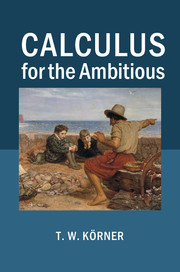Book contents
- Frontmatter
- Epigraph
- Contents
- Introduction
- 1 Preliminary ideas
- 2 The integral
- 3 Functions, old and new
- 4 Falling bodies
- 5 Compound interest and horse kicks
- 6 Taylor's theorem
- 7 Approximations, good and bad
- 8 Hills and dales
- 9 Differential equations via computers
- 10 Paradise lost
- 11 Paradise regained
- Further reading
- Index
6 - Taylor's theorem
Published online by Cambridge University Press: 05 June 2014
- Frontmatter
- Epigraph
- Contents
- Introduction
- 1 Preliminary ideas
- 2 The integral
- 3 Functions, old and new
- 4 Falling bodies
- 5 Compound interest and horse kicks
- 6 Taylor's theorem
- 7 Approximations, good and bad
- 8 Hills and dales
- 9 Differential equations via computers
- 10 Paradise lost
- 11 Paradise regained
- Further reading
- Index
Summary
Do the higher derivatives exist?
Mathematicians sometimes express opinions about non-mathematical topics to the intense annoyance of those who feel that they should stick to their own business. In 1734, a very annoyed Bishop Berkeley decided to attack mathematicians on their home ground and wrote a short, but extremely clever, pamphlet entitled
THE ANALYST
A Discourse addressed to an Infidel Mathematician.
Wherein it is examined
whether the Object, Principles, and Inferences
of the modern Analysis are more distinctly conceived,
or more evidently deduced, than Religious Mysteries and Points of Faith.
In it, he argues that the calculus as then conceived was such a tissue of unfounded assumptions as to remove every shred of authority from its practitioners. If the reader substitutes our ‘derivative’ for words like ‘fluxions’, ‘differences’ and ‘infinitesimals’ she will get the flavour of his attack
And yet in the calculus differentialis, which Method serves to all the same Intents and Ends with that of Fluxions, our modern Analysts are not content to consider only the Differences of finite Quantities: they also consider the Differences of those Differences, and the Differences of the Differences of the first Differences. And so on ad infinitum. That is, they consider Quantities infinitely less than the least discernible Quantity; and others infinitely less than those infinitely small ones; and still others infinitely less than the preceding Infinitesimals, and so on without end or limit. …
Information
- Type
- Chapter
- Information
- Calculus for the Ambitious , pp. 95 - 107Publisher: Cambridge University PressPrint publication year: 2014
